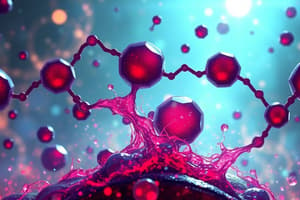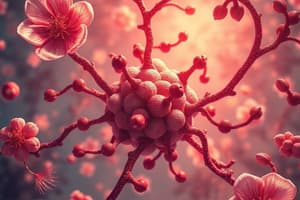Podcast
Questions and Answers
What is the common cause of hepatocellular jaundice?
What is the common cause of hepatocellular jaundice?
- Liver failure (correct)
- Hemolytic anemia
- Gallstones
- Rhesus incompatibility
What is the condition that causes a defect in the ability of hepatocytes to secrete conjugated bilirubin into the bile?
What is the condition that causes a defect in the ability of hepatocytes to secrete conjugated bilirubin into the bile?
- Dubin-Johnson syndrome (correct)
- Rotor syndrome
- Crigler-Najjar syndrome
- Gilbert syndrome
What causes unconjugated hyperbilirubinemia in neonates?
What causes unconjugated hyperbilirubinemia in neonates?
- Incomplete maturation of bilirubin UDP-glucuronyl transferase (correct)
- Reduced or no UDP-glucuronyl transferase in liver
- Impaired secretion of bilirubin from hepatocytes into the bile
- Transporter defect
What is the treatment for Crigler-Najjar syndrome?
What is the treatment for Crigler-Najjar syndrome?
Which liver disease occurs when the flow of bile from the liver is reduced or blocked?
Which liver disease occurs when the flow of bile from the liver is reduced or blocked?
What causes Dubin-Johnson syndrome?
What causes Dubin-Johnson syndrome?
What is the condition that can occur in newborns due to transiently low UDP-glucuronyl transferase?
What is the condition that can occur in newborns due to transiently low UDP-glucuronyl transferase?
What is the result of impaired hepatocellular storage of conjugated bilirubin leaking into plasma causing hyperbilirubinemia?
What is the result of impaired hepatocellular storage of conjugated bilirubin leaking into plasma causing hyperbilirubinemia?
What is the impact of perivenous hepatocytes being exposed to lower oxygen tension and lower nutrient and hormone levels than periportal hepatocytes?
What is the impact of perivenous hepatocytes being exposed to lower oxygen tension and lower nutrient and hormone levels than periportal hepatocytes?
Flashcards are hidden until you start studying
Study Notes
Heme Metabolism
- Heme is a tightly bound prosthetic group of hemoglobin, myoglobin, cytochrome P450, catalase, and many other proteins.
- It comprises one ferrous ion (Fe2+) in the center and protoporphyrin IX (a tetrapyrrole ring).
Heme Synthesis
- Heme is synthesized principally in the bone marrow for erythrocytes and in the liver for cytochrome P450.
- The process involves the condensation of two molecules of aminolevulinic acid (ALA) to form porphobilinogen.
- The enzyme ALAS1 (aminolevulinate synthase 1) is the rate-limiting step of heme synthesis in the liver, and ALAS2 is responsible for heme synthesis in the bone marrow.
Regulation of Heme Synthesis
- Hemin, the oxidized form of heme, acts as a feedback inhibitor of ALAS1 in the liver.
- Low iron inhibits ALAS2 expression in erythroid cells.
- Erythropoietin induces ALAS2 expression in the bone marrow.
Porphyrias
- Defects in heme synthesis can lead to porphyrias, a group of rare genetic disorders.
- Accumulation of porphyrin precursors in the blood and urine is a hallmark of porphyrias.
- Symptoms include abdominal pain, cutaneous photosensitivity, and neurological abnormalities.
Classification of Porphyrias
- Hepatic porphyrias: e.g., porphyria cutanea tarda, acute intermittent porphyria.
- Erythropoetic porphyrias: e.g., erythropoietic protoporphyria, congenital erythropoetic porphyria.
Heme Degradation and Excretion
- Heme is degraded to bilirubin in macrophages and then transported to the liver for excretion in the bile.
- Bilirubin is conjugated with glucuronic acid in the liver and secreted into the bile as a diglucuronide adduct.
Disorders of Heme Degradation
- Jaundice occurs when bilirubin levels in the blood and skin increase, often due to defects in heme degradation and excretion.
- Examples of disorders include Crigler-Najjar, Gilbert's, Dubin-Johnson, and Rotor syndromes.
Studying That Suits You
Use AI to generate personalized quizzes and flashcards to suit your learning preferences.




